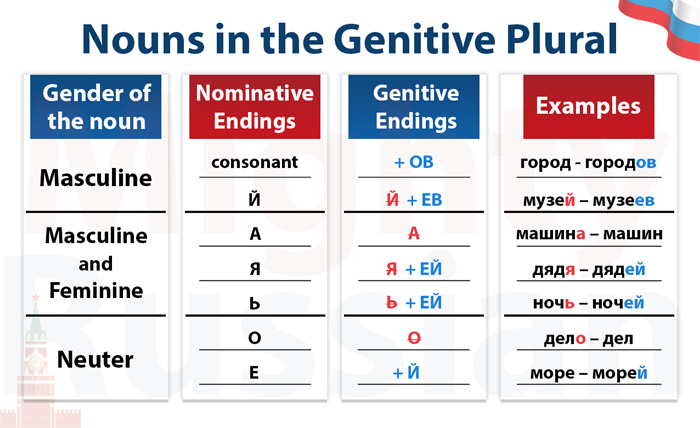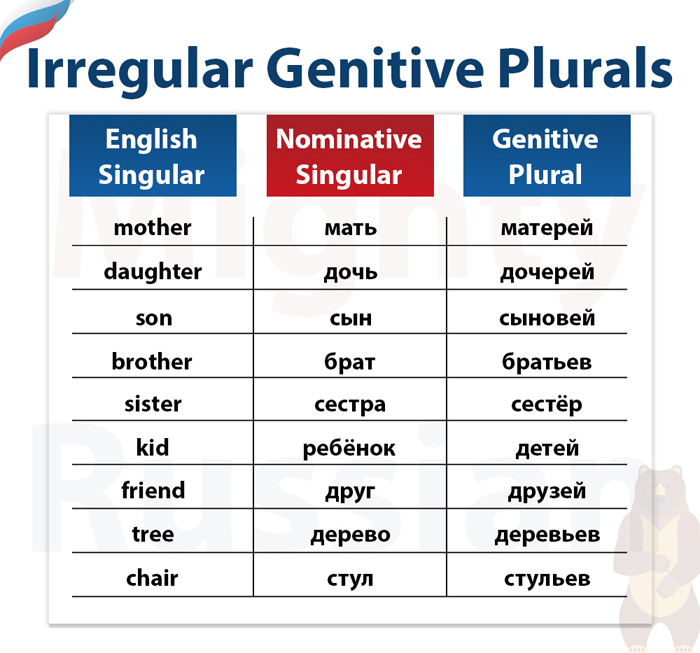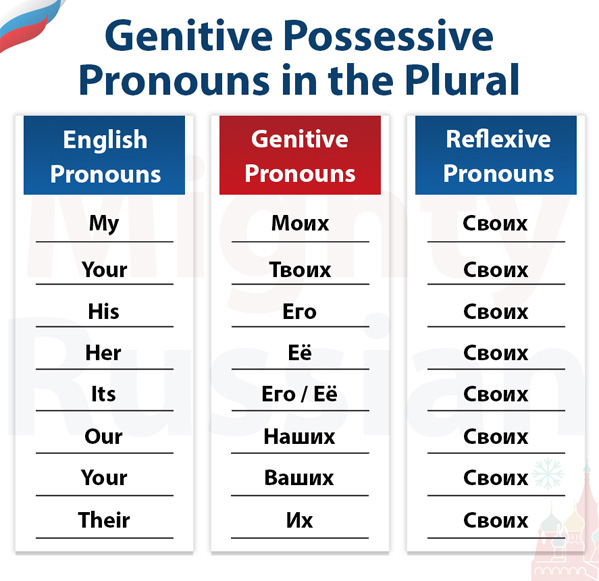It seems that you are looking at an outdated version of this lesson.
Click here to see the latest version of it, which includes examples with audio, integration with our dictionary and exercises.
Russian Genitive Case in the Plural
The Genitive Case is a bit more complicated than other cases when it comes to the plural, but it is very common and useful.
Knowing how to use the Genitive Case in the plural will sure make your skills in Russian much better.
In this lesson, you will learn:
1) How to use the Genitive Case with plural nouns;
2) How to use the Genitive Case with plural adjectives;
3) How to use the Genitive Case with plural Possessive Pronouns.
If there is any specific part of the lesson you would like to learn first, you can click on it and go straight to that subject.
If you don’t know yet when you should use the Genitive Case in Russian or how to use it with nouns and adjectives in the singular, you can check out our complete lesson about this subject clicking here.
The Genitive Case of Nouns in the Plural
Plural nouns in the Genitive Case have 4 endings.
Here is a table with all of them.
To make things easier, let’s take a look at each of them individually.
1) Remove the last letter of nouns that end in “А” and “О”:
У моей сестры много дел (My sister has many things to do)
дело – дел
В моей деревне мало машин (There are few cars in my village)
машина – машин
Note that when the plural noun ends in two consonants, the vowel “О” or “Е” is often added between the two consonants:
В доме много окон (There are many windows in the house)
окно – окон
Я никогда не видел так много писем (I have never seen so many letters)
письмо – писем
2) Add “ОВ” to masculine nouns that end in a consonant:
Учитель купил шоколад для студентов (The teacher bought chocolate for the students)
В России много городов (There are many cities in Russia)
If the masculine noun ends in “Ж”, “Ш”, “Щ” and “Ч”, add “ЕЙ” instead:
Там нет врачей (There aren’t doctors there)
У него нет ключей (He doesn’t have the keys)
3) When masculine and feminine nouns end in “Ь”, replace “Ь” with “ЕЙ”:
Мы провели там 5 ночей (We spent 5 nights there)
Я нашёл в библиотеке много словарей (I found many dictionaries in the library)
And when neuter nouns end in “Е”, just add “Й”:
Сколько в мире морей? (How many seas are there in the world?)
Фермеры пришли с полей (The farmers came from the fields)
4) When masculine nouns end in “Й”, replace “Й” with “ЕВ”:
В Marvel много героев (Marvel has many heroes)
В нашем городе нет музеев (There are no museums in our city)
If you are not familiar with the concept of gender in Russian, you can check out our complete lesson about this subject clicking here.
Some genitive plural forms are irregular. The most common of them are:
The Genitive Case of Adjectives in the Plural
Plural adjectives in the Genitive Case have only 2 endings: “ИХ” and “ЫХ”.
In most cases, you will use the ending “ЫХ”:
У молодых людей есть смартфоны (Young people have smartphones)
У меня нет красных футболок (I don’t have red t-shirts)
Они купили подарки для своих старых друзей (They bought gifts for their old friends)
And you will normally use “ИХ”, when the last consonant of the adjective is “Г”, “К”, “Х”, “Ж”, “Ч”, “Ш” or “Щ”:
У неё много хороших друзей (She has many good friends)
Я получил подарки от своих русских друзей (I got gifts from my Russian friends)
Мой брат купит свежих овощей (My brother will buy some fresh vegetables)
The Genitive Case of Possessive Pronouns in the Plural
The Possessive Pronouns in the Genitive Case are very similar to the adjectives.
As you can see, in most cases, you will just take the Nominative Possessive Pronouns and replace their endings with “ИХ”.
For example:
Я всегда готовлю еду для своих детей (I always make food for my kids)
Они нашли работу для твоих братьев (They found a job for your brothers)
У его родственников много денег (His relatives have a lot of money)
And that’s it. Now you know how to use the Genitive Case in the Plural.
I hope everything got clear, but if you have any questions, just leave them in the comment section below.
I will be very happy to help you!














